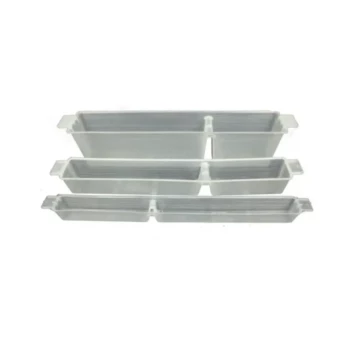In short, bee colonies that do not receive supplemental feed during challenging seasons are highly likely to dwindle and face potential collapse. When natural nectar and pollen sources become scarce due to conditions like drought or extreme temperatures, a colony's internal food stores are consumed faster than they can be replenished, leading to a critical energy deficit.
The core issue is a mismatch between a colony's needs and its environment's resources. Supplemental feeding is a strategic intervention to bridge this gap, ensuring the colony has the energy to maintain its population and survive until natural forage returns.

A Colony's Annual Energy Budget
To understand why a lack of feed can be catastrophic, you must view the beehive as a living economy that operates on an annual energy budget. Its survival depends entirely on balancing resource collection, consumption, and storage across the seasons.
Spring: The Growth Phase
In the spring, a healthy queen rapidly increases her egg-laying to build the colony's population. This "brood production" requires immense resources, primarily pollen for protein and nectar for carbohydrates.
If a nectar dearth occurs during this critical phase, the colony's expansion will halt. Workers cannot produce the necessary food, and the queen will slow or stop laying eggs, crippling the workforce needed for the main summer honey flow.
Summer: Peak Production and Storage
Summer is the primary season for nectar collection and honey production. The bees' goal is to gather a surplus far beyond their immediate needs.
This surplus is stored as honey, which serves as their essential food source for the fall and winter. A challenging summer—marked by extreme heat or drought that kills nectar-producing flowers—means the colony cannot build these critical winter reserves.
Fall: Preparing for Winter
During the fall, foraging slows, and the colony's focus shifts inward. They work to consolidate their honey stores and prepare the hive for the cold months ahead.
If the summer was poor, the bees enter fall with a significant deficit. Without supplemental feeding now, they have no way to build the stores required to survive the long, flowerless winter.
Winter: Survival Mode
In winter, bees form a cluster around the queen, vibrating their muscles to generate heat and keep the core of the hive alive. This process consumes a tremendous amount of energy, which is fueled entirely by their stored honey.
A colony without sufficient honey stores will starve. The bees will burn through their last reserves and then perish from a combination of cold and hunger.
Understanding the Trade-offs of Feeding
While feeding can be a life-saving measure, it is an intervention that comes with its own set of risks and is not a replacement for good management.
Creating Unnatural Dependency
Feeding during a strong natural nectar flow is unnecessary and can make bees "lazy," reducing their drive to forage. The goal is to supplement, not replace, their natural behavior.
Attracting Pests and Robbers
Openly feeding or spilling sugar syrup around the hive is an open invitation to ants, wasps, and—most dangerously—robber bees from competing colonies. A robbing frenzy can quickly decimate a weak hive.
Risk of Contaminating Honey
Never feed sugar syrup when you have honey supers on the hive that you intend to harvest for human consumption. Doing so will result in "honey" that is adulterated with processed sugar, not pure nectar.
Making the Right Choice for Your Goal
Effective supplemental feeding is about observation and precise timing. Your strategy should adapt to the colony's specific needs and your ultimate objective as a beekeeper.
- If your primary focus is stimulating spring growth: Feed a thin 1:1 sugar-to-water syrup to simulate a natural nectar flow and encourage the queen to lay eggs.
- If your primary focus is ensuring winter survival: Feed a thick 2:1 sugar-to-water syrup in the fall to allow bees to quickly build up their essential honey stores.
- If your primary focus is supporting a new or weak colony: Provide consistent feeding until the colony has drawn out enough comb and built a large enough population to forage effectively on its own.
Ultimately, successful beekeeping hinges on observing your colony's health and acting as a responsible steward of its resources.
Summary Table:
| Season | Primary Challenge | Consequence of No Feed |
|---|---|---|
| Spring | Nectar dearth during growth phase | Halts brood production, cripples workforce |
| Summer | Poor forage due to heat/drought | Fails to build critical winter honey reserves |
| Fall | Entering winter with a deficit | Unable to build essential stores for survival |
| Winter | Survival on stored honey only | Starvation and death from cold and hunger |
Ensure your apiary's success with reliable feeding supplies from HONESTBEE. We understand the critical balance between a colony's needs and environmental challenges. Our wholesale-focused operations provide commercial apiaries and beekeeping equipment distributors with the high-quality supplies necessary for strategic supplemental feeding, from feeders to essential equipment. Don't let a challenging season risk your colonies—partner with HONESTBEE to build resilience and secure your operation's future. Contact our team today to discuss your needs.
Visual Guide

Related Products
- HONESTBEE Entrance Bee Feeder Professional Hive Nutrition Solution for Beekeeping
- Rapid Bee Feeder White Plastic 2L Round Top Feeder for 8 or 10-Frame Bee Hives
- In-Hive Dual Compartment Frame Bee Feeder for Targeted Colony Nutrition
- Professional Hive Front Entrance Bee Feeder
- HONESTBEE Professional Hive Top Bee Feeder Feeding Solution
People Also Ask
- When is a large capacity feeder most advantageous? Maximize Efficiency in Winter Prep and Remote Apiary Management
- How do vacuum feeders facilitate the delivery of dsRNA suspensions in honeybee trials? Precision Dosing & Biosecurity
- What are the advantages of Boardman feeders? A Guide to Hive-Feeding Convenience and Risks
- When and how should a cell-raising colony be fed? Maximize Queen Quality with Strategic Nutrition
- What are the different types of feeders used in beehives? Optimize Hive Health and Nutrition
- What ingredients are used to formulate high-protein supplements for honey bees? Optimize Your Colony's Brood Growth
- What are the advantages and disadvantages of an entrance feeder? Optimize Your Apiary's Feeding Strategy
- Is sugar water harmful to bees? A Beekeeper's Guide to Safe Supplemental Feeding



















